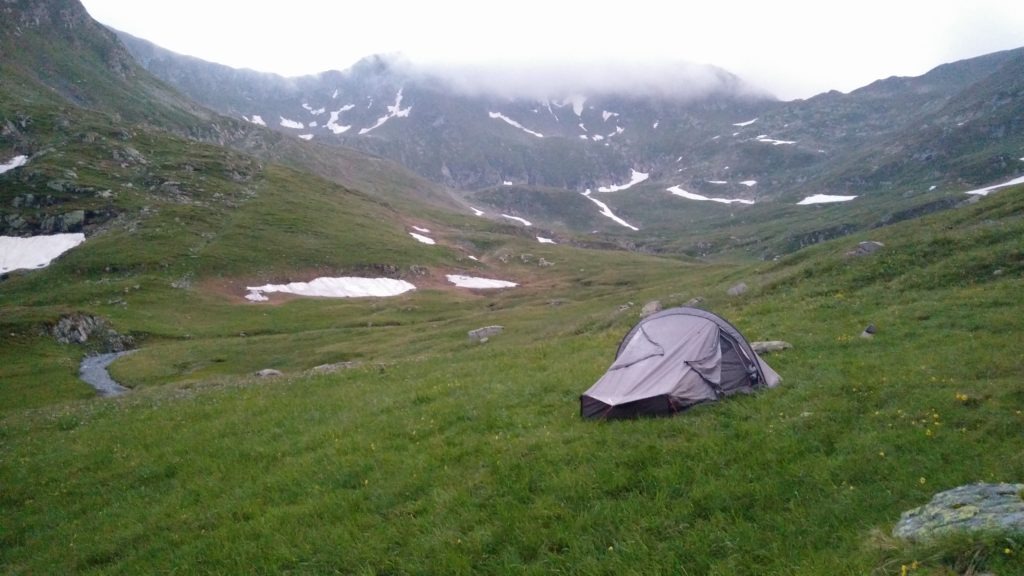
This article is a complete overview about wild camping in Europe. Where is it legally allowed? Where is it tolerated? Where should you definitely not be wild camping? This differs from country to country, there might even be different rules for certain areas in the same country. I listed all of the European countries and made an easy overview. In a lot of European countries, wild camping is legally not allowed without permission of the landowner. However, as long as you are discreet, stay out of sight and leave no trace, you are most likely not going to get in trouble.
Hint: If you want to search for a certain country simply click Ctrl + f.
Last updated in 2022. Please note that this is a hiking wild camping guide (information does not necessarily apply for RV’s).
Northern Europe
Northern Europe is generally very wild camping friendly. There is only one country in Northern Europe where wild camping is not legal, Denmark. But even Denmark provides plenty of alternatives. Certain countries in this area of the world do not only legally allow wild camping, they even encourage it.
Wild camping in Denmark
Wild camping in Denmark is legally not allowed, you cannot pitch your tent anywhere you want. That said, there are a lot of primitive campsites and free tenting zones spread across the country.
These primitive camping spots are sometimes equipped with a basic wooden shelter, this means that you could even consider wild camping without a tent. Note that both free tenting zones and primitive campsites are meant for hikers who will only stay for one night. It’s not meant for a large group who wants to stay there for multiple nights.
Camping on any kind of beach is strictly forbidden in Denmark.
If you camp outside these campsites, chances are not very high that you will get caught, but if you do get caught, you can expect a small fine.
Wild camping in Estonia
Wild camping in Estonia is legal with the exception of certain National Parks. Wild camping is part of the Estonian culture so you shouldn’t expect any trouble.
There are even a lot of official campsites with some public facilities that are completely free.
Wild camping in Finland
Wild camping in Finland is legal, but there might be certain exceptions/restrictions. It’s advisable to do some research before wild camping in Finland, but in most places wild camping is allowed.
Wild camping in Iceland
Wild camping in Iceland is technically legal on uncultivated ground as long as there are no more than 3 tents and that you only stay one night. However, there are a lot of regulations (especially in the touristic/crowded areas) and it is kind off discouraged.
In the highlands there are less restrictions when it comes to wild camping.
If you are close to an official camping ground you should make use of them. You are only allowed to camp in the wild if you find yourself away from registered campsites.
Wild camping in Latvia
Wild camping in Latvia is legal, but there are certain exceptions/restrictions. Make sure to check that wild camping is legal in the area you want to go, but in most of the country it is completely legal.
Wild camping in Lithuania
Wild camping in Lithuania is legal, but there are certain exceptions/restrictions. Lithuania is very similar to Latvia when it comes to wild camping. So once again, make sure to check that wild camping is legal in the area you want to go, but in most of the country it is completely legal.
Wild camping in Sweden
Wild camping in Sweden is completely legal and even encouraged. The right to roam is enshrined in the Swedish law. There are barely any regulations as long as you don’t stay too close to any houses. You are even allowed to stay two nights at the exact same camping spot.
Campfires are also allowed unless it’s specifically indicated that it is forbidden in a certain area.
This is one of the best places to go hiking and wild camping.
Wild camping in Norway
Wild camping in Norway is completely legal end even encouraged. Norway is very similar to Sweden when it comes to wild camping. Just make sure that you are camping on uncultivated ground (no farm ground and not too close to houses).
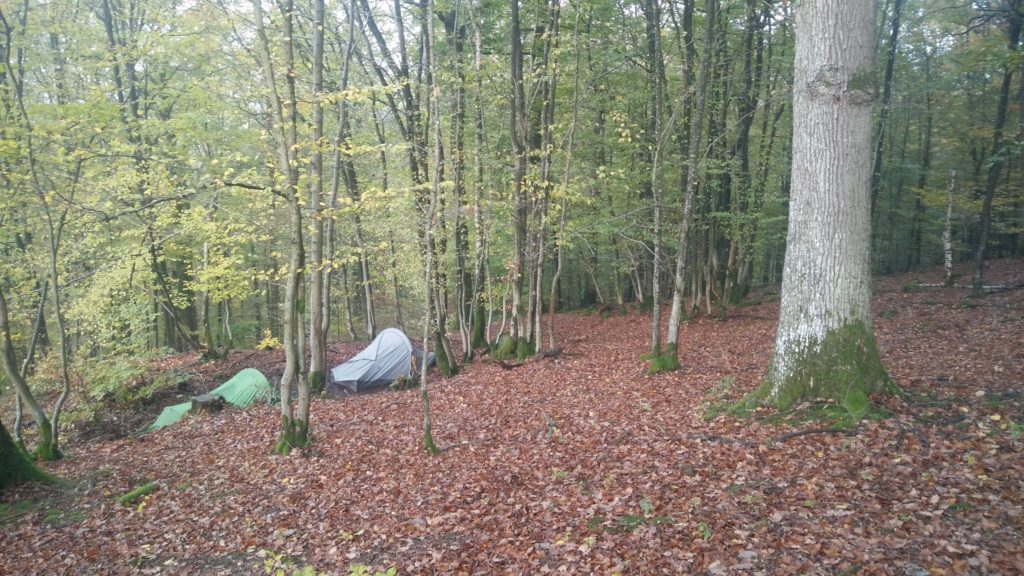

Central Europe
Central Europe is not as wild camping friendly as the northern countries, but most countries will at least allow a planned bivouac (one night).
Wild camping in Austria
Wild camping in Austria is legally not allowed. However, a planned bivouac (for one night) is mostly tolerated as long as it’s outside one of the prohibited areas. A planned bivouac means that using an improvised shelter is allowed, but setting up a tent is not.
So make sure to bring a bivouac sack instead of an actual tent if you are planning on wild camping in Austria.
Wild camping in the Czech Republic
Wild camping in the Czech Republic is very similar to wild camping in Austria. It’s legally not allowed. However, a planned bivouac (for one night) is tolerated as long as it’s outside one of the prohibited areas.
So make sure to bring a bivouac sack instead of an actual tent if you are planning on wild camping in the Czech Republic.
Wild camping Germany
Wild camping in Germany is similar to wild camping in Austria or in the Czech Republic. It’s legally not allowed. However, a planned bivouac (for one night) is mostly tolerated as long as it’s outside one of the prohibited areas.
So make sure to bring a bivouac sack instead of an actual tent if you are planning on wild camping in Germany.
Wild camping in Hungary
Wild camping in Hungary is legally allowed, but very restricted. You are only allowed to stay at the same place for 24 hours.
Wild camping in any of the National Parks is illegal, and these Parks are frequently patrolled by foresters. It’s hard to get deep into the wilderness because there are not a lot of wild areas in Hungary.
So yes you are allowed to wild camp in Hungary, but you should double check everything before you do. There are also bans on campfires if it hasn’t rained for a while.
Wild camping in Poland
Wild camping in Poland is illegal. However, it is widely tolerated. Only in the national Parks they are a little more strict about it. Especially in the more touristic and crowded places like the Tatra mountains.
That said, as long as you are modest, discreet and you find a remote place where people won’t find you, you should not run into any trouble.
This is one of the countries where wild camping is illegal but tolerated.
Wild camping in Slovakia
Wild camping in Slovakia is legally allowed, but not in any of the National Parks. If you were thinking about camping in the Slovakian part of the Tatra mountains, you must know that this is legally not allowed.
Wild camping in Slovenia
Wild camping in Slovenia is illegal. If you go deep enough into the wilderness and don’t make a fire you should be fine, but know that it’s legally not allowed. Some people claim that it’s illegal but tolerated, but others disagree with that statement, it might depend on the region.
Wild camping in Switzerland
Wild camping in Switzerland is illegal, but it’s tolerated. Just make sure to be discreet and leave no trace.
If you do get caught, there is a pretty good chance that they will not send you away. The chance that you get a fine is very low, but theoretically possible.
In the mountains a planned bivouac for one night is legally allowed.
Wild camping in Liechtenstein
Wild camping in Liechtenstein is illegal. I assume that a planned bivouac is allowed for one night, but I couldn’t find a solid source that could verify this.
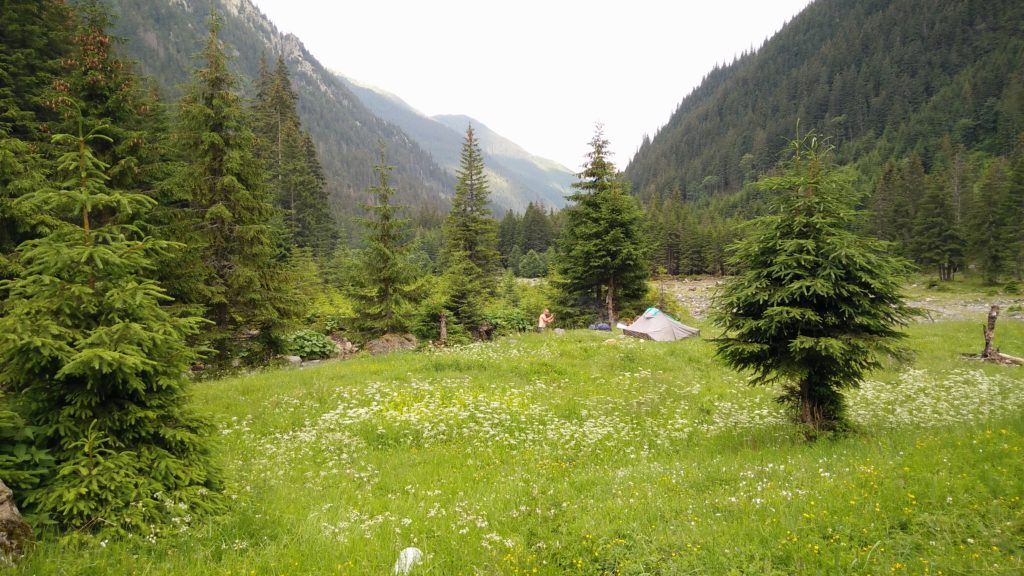

Eastern Europe
In Eastern Europe, there are not really a lot of laws in place that prohibit wild camping. In these countries they generally don’t have any issue with this. Additionally, there is so much wilderness in these countries that they couldn’t possibly patrol the entire area. Note that this only applies to Eastern Europe, not necessarily to Southeastern Europe.
Wild camping in Armenia
Wild camping is legally allowed in Armenia. There are also not really any restrictions or limitations.
Wild camping in Georgia
Wild camping is legally allowed in Georgia. There are also not really any restrictions or limitations.
Wild camping in Ukraine
Wild camping is legally allowed in Ukraine. There are some restrictions in National Parks, but they are not strictly enforced.
Wild camping in Belarus
Wild camping is legally allowed in Belarus. There are also not really any restrictions or limitations.
Wild camping in Moldova
Wild camping is legally allowed in Moldova. There are also not really any restrictions or limitations.
Wild camping in Russia
Wild camping in Russia is legally allowed, but there are certain restrictions.
Making a campfire is also legal, with exception of the hottest months.
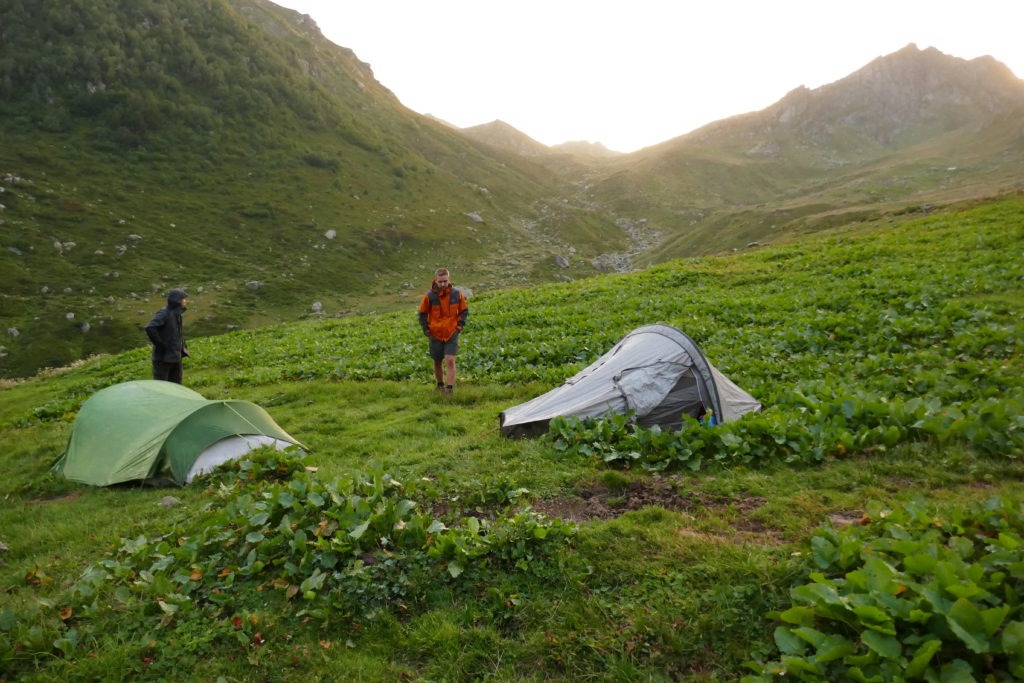

Southeastern Europe
Southeastern Europe is not as wild camping friendly as Eastern Europe. There are a couple of laws in place that prohibit wild camping. However, in most of these countries, wild camping is tolerated even if it’s legally not allowed. Just make sure to avoid touristic places, beaches and sometimes National Parks.
Wild camping in Albania
Wild camping in Albania is very tolerated. I was unable to find any official restrictions, however, some individuals claimed that it is technically illegal. Even if there are restrictions, they are not strictly enforced at all.
There is a lot of wild places that are perfect for camping, you shouldn’t expect any trouble. In this country, hospitality is still a thing, highlander culture is very strict about taking care of their guests. You might want to keep this in the back of your mind if you want a break from sleeping in a tent for a night.
Wild camping in Bosnia and Herzegovina
Wild camping in Bosnia and Herzegovina is legally allowed, but not advisable unless you know what you are doing. There are a lot of wild places where you can wild camp in the wilderness. But… Bosnia and Herzegovina has one of the most severe landmine problems in the entire world.
You can definitely go wild camping in this country, but before you do, make sure to do some research on the area. Also, if you can see signs that other people have camped in a certain place it’s probably alright.
Wild camping in Bulgaria
Wild camping in Bulgaria is illegal, but mostly tolerated. That said, recently Bulgaria added a new law that explicitly forbids camping outside the camping spots. There are a couple of places on the Bulgarian Beaches where people wild camp the entire summer, I guess this was the reason that they included this new law.
I don’t think they want to target hikers who only stay one night on the same place, as people still tell me it’s tolerated, but legally it’s not allowed. I would not advise against wild camping in Bulgaria, but make sure to stay discreet. Only make a fire if you absolutely have to and if you are completely out of sight, even then, keep it modest. Be extra careful when camping in the popular National Parks.
Wild camping in Croatia
Wild camping in Croatia is legally not allowed. Tourism is very important for Croatia. If all these tourists simply go wild camping that would be bad for business. Therefore, they (kind off) do enforce this law.
That said, if you decide to stay away from the touristic places and you go to a very remote place, you are probably not going to run into trouble. Just make sure you stay discreet. However, I would advise against wild camping in touristic places, especially touristic beaches.
Wild camping in Greece
Wild camping in Greece is legally not allowed, but tolerated in certain parts of the country. Make sure to stay away from the touristic places if you want to go wild camping. Sadly this includes almost all of the Greek beaches. Additionally, you should probably avoid wild camping in the National Parks.
If you find yourself in a very remote area in the middle of the mountains, you shouldn’t run into any trouble.
Wild camping in Kosovo
Wild camping in Kosovo is legally allowed. I couldn’t find any restrictions. There are plenty of beautiful camping spots in the wild, so Kosovo is great for wild camping.
Wild camping in Macedonia
Wild camping in Macedonia is legally not allowed, but tolerated. A lot of locals also do this. Macedonia is a very beautiful country, with a lot of places where you can wild camp without bothering anyone. I would not advise against wild camping in Macedonia, but I would encourage to be discreet.
Wild camping in Montenegro
Wild camping in Montenegro is legally not allowed, but tolerated in certain areas. Make sure to avoid the touristic areas, the beach and if possible the National Parks. If you go wild camping anywhere else and you don’t make a fire and clean up afterwards, you really shouldn’t have any trouble.
Wild camping in Romania
Wild camping in Romania is legally not allowed, but widely tolerated. This is one of these countries where they might as well remove that law because it is not being enforced at all. I assume the worst thing that could happen is that a corrupt ranger would ask you a small fine. These things could happen in poor countries, but in my experience, these people are very friendly. You would need some serious bad luck.
Wild camping in Serbia
Wild camping in Serbia is legally allowed, but not in the National Parks. But even in the National Parks, these rules are not strictly enforced. You shouldn’t have any trouble with wild camping in this country.
Wild camping in Slovenia
Wild camping in Slovenia is illegal, but tolerated in certain areas. Be careful if you want to go wild camping in any of the popular places (Lake Bed, Triglav National park), there might be rangers there and you could risk a fine.
Wild camping in Turkey
Wild camping in Turkey is completely legal. I could not find any restrictions.
Wild camping in Cyprus
Wild camping in Cyprus is legal, with certain restrictions. There are apparently certain protected areas where wild camping is illegal, but other than that, you are good to go.
One thing I wanted to mention is that Cypriots don’t really care if you camp wild, but they do care that you light a fire during the hottest months. They are very strict about this and with good reasons, it can be very dangerous.
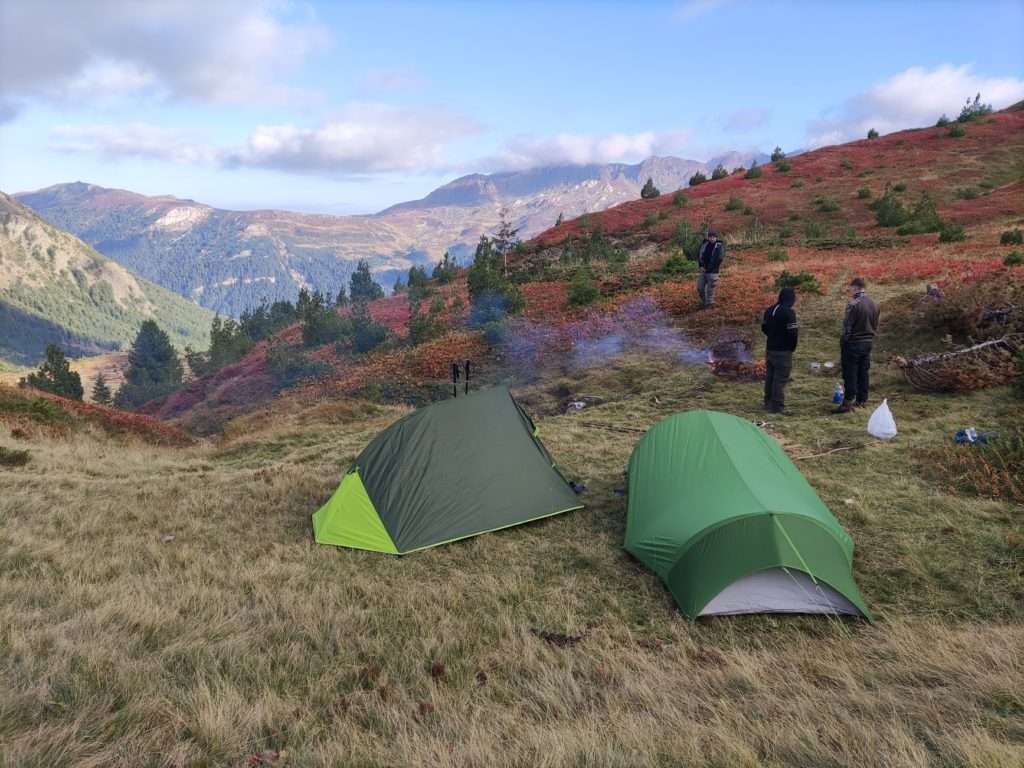

Western Europe
Wild camping in Western Europe is definitely not that easy. It’s illegal in most countries and only tolerated in a few of them. This isn’t really surprising since this part of the world is very densely populated and there isn’t that much nature left.
Wild camping in Belgium
Wild camping in Belgium is illegal. Belgium is a very small and densely populated country, there are isn’t really that much nature. It’s almost impossible to really get away from civilization. Therefore, Belgium is one of the few countries where I really do not recommend wild camping.
There is something called “bivouac zones” or “pole camping’s”. These are designated areas where you can wild camp (I don’t know if this still counts as wild camping). You can find these zones here: bivakzone.
If you don’t like the idea of having to stay at a bivouac zone, I would recommend to cross the border to France, where the laws are more flexible.
Wild camping in France
Wild camping in France is complicated. In most places, wild camping is officially illegal. However, most of the national and regional parks have their own rules. You can find more information about these rules in this article: Wild camping in France: Complete guide.
Additionally, you should be one hour away from the road. I can’t imagine this being strictly enforced, but know that you shouldn’t stick too close to the roads if you want to wild camp in France.
Official legal information can be found here (in French).
Wild camping in Ireland
Wild camping in Ireland is illegal, but tolerated in certain areas. If you are in a remote place, you shouldn’t worry to much about getting a fine.
Wild camping in Luxembourg
Wild camping in Luxembourg is illegal. The country is so small that it’s not too hard to catch wild campers. They also seem to very strict about this. Definitely not a good country for wild camping.
Wild camping in Monaco
Wild camping in Monaco is illegal. Where would you even attempt to wild camp in Monaco?
Wild camping in the Netherlands
Wild camping in the Netherlands is illegal. The situation is very similar to that in Belgium. The Netherlands are very densely populated and there is even less nature. They do, however, also have “bivouac zones” or “pole camping’s” that you can use. These are completely free and legal. Learn more about this here.
Wild camping in the United Kingdom
Wild camping in the United Kingdom is legal in certain areas. Generally, if you are in a remote area and you stay discreet, you shouldn’t get into trouble.
That said, there are a couple of things to keep in mind before you go wild camping in the UK. In certain areas wild camping is tolerated, but in other areas, the wild camping laws are enforced. I wrote a complete article on wild camping in the UK for those of you who want to know more about the subject.
Wild camping in England
Wild camping in England is illegal, with the exception of Dartmoor.
Wild camping in Wales
Wild camping in Wales is illegal.
Wild camping in Scotland
Wild camping in Scotland is legal, but there are some exceptions. It’s recommended to do your research before you leave for your trip, especially if you are going to an island.
Wild camping in Northern Ireland
Wild camping in Northern Ireland is illegal, but mostly tolerated. A lot of the land in Northern Ireland is private land and strictly speaking you need permission, but if you are in a remote area, it’s mostly tolerated.
In the mountains and on public grounds it’s definitely tolerated.
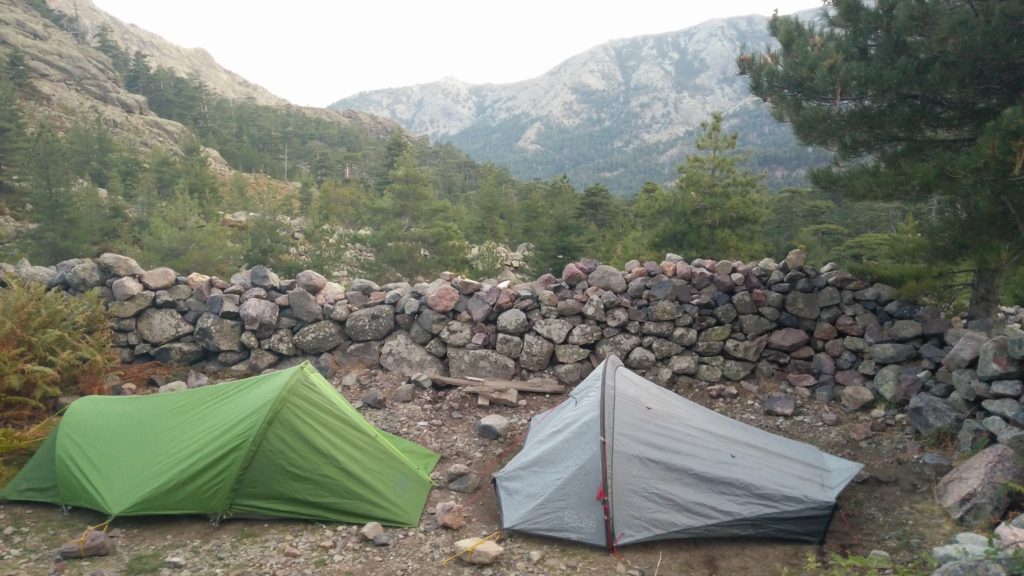

Southern Europe
Southern Europe is probably the least interesting place in Europe to go for wild camping. In most places it’s illegal, and more often than not, it’s also not tolerated.
Wild camping in Italy
Wild camping in Italy is complicated. The situation in Italy is similar to the situation in France. The laws are not on a national level, but on a local level. It seems that wild camping is not really appreciated when you stay multiple nights. But a discreet overnight bivouac in the mountains will definitely not be an issue.
Definitely stay away from crowded/touristic places unless you are absolutely sure that wild camping is allowed. The rules are strictly enforced in certain areas.
Wild camping in Malta
Wild camping in Malta is illegal. It’s also not really tolerated. If you really want to go wild camping in Malta you should ask the local council. From what I understand, they might give you permission.
Wild camping in Portugal
Wild camping in Portugal is illegal. During low season however, nobody is probably going to bother you. Make sure that you pitch your tent well out of sight and you probably shouldn’t make a campfire either. There are certain areas that you should absolutely avoid, even during low season, especially beaches should be avoided.
Wild camping in Spain
Wild camping in Spain is complicated. Similar to France and Italy, the wild camping rules are made up locally and not nationally.
That said, in most places in Spain, wild camping is forbidden. In most of these places it’s also not tolerated. In fact, the Guardia Civil has a special section that actively tries to find wild campers. If you are not allowed to camp somewhere in Spain, just don’t do it, the rules are strictly enforced.
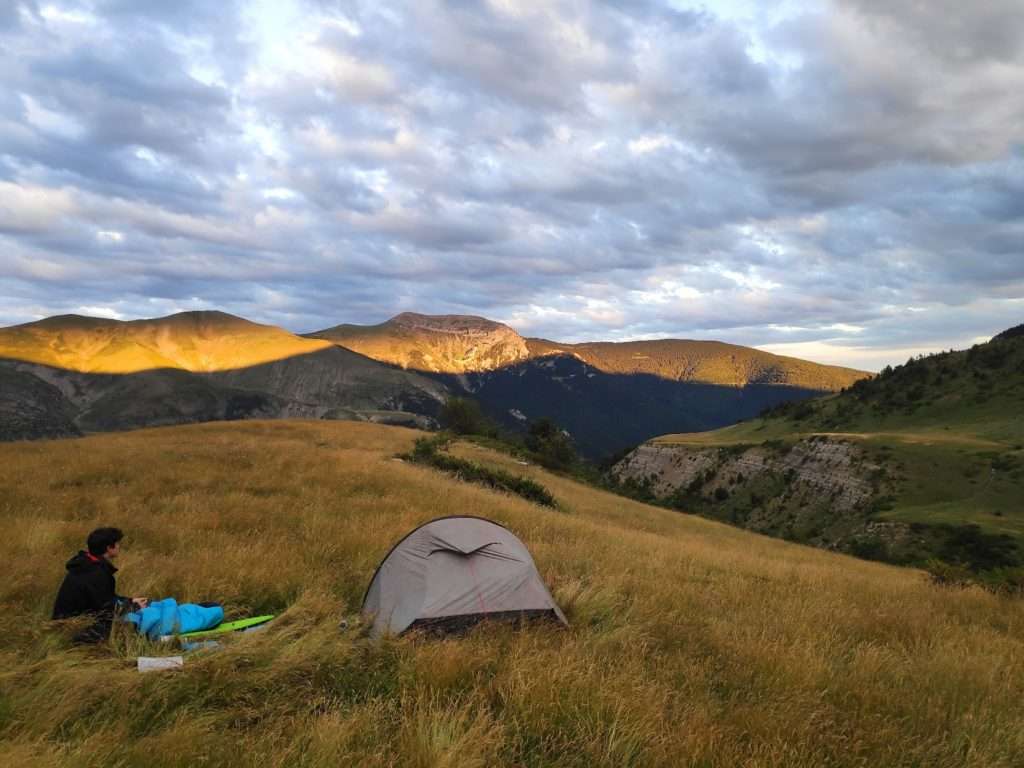

Leave no trace
I know you came here to learn about where it’s legal and/or tolerated to camp wild and not to learn about “leave no trace”. However, I simply couldn’t write an article about wild camping without mentioning the leave no trace principles.
You probably already know this, but if you don’t, make sure to learn and apply these rules. It’s my personal opinion that wild camping should almost always be allowed, but you absolutely have to respect “leave no trace”.
You can learn more about “leave no trace” here: The Leave No Trace Seven Principles.
Disclaimer – help optimize this article
Most information comes from online resources. I tried to find multiple sources that verified a fact before adding anything to this article. However, for some countries there was simply not enough information to be found online.
Additionally, I can imagine that people might think wild camping is legal just because it is very tolerated.
Anyway, I can’t be 100% sure about everything. If you have some additional information, or you disagree with certain things in this article, please let me know. I want to optimize this article as good as possible.
Final words
Make sure that you are well prepared for your wild camping trick.
Proper camping and hiking gear are a must.
Probably the most important items are solid hiking shoes (trail running shoes can also be used) and a lightweight tent.
Bonjour, merci beaucoup pour cet article !
Helas comme les quelques autres, vos conseils sont tres utiles mais il n’y a aucun moyen de savoir concretement comment cela se passe sur place … 🙁
S’il faut batailler et que l’amende est aleatoire et a la tete du client, ca risque de vite devenir invivable …
J’ai surtout l’impression que le camping sauvage a long terme est clairement irrealisable …
Keep functioning ,remarkable job!
Pingback: Google
Pingback: Google
Pingback: Online reverse phone lookup
Pingback: Handlateknik
Pingback: Kratom near me
Very good post. I am dealing with a few of these issues as well..